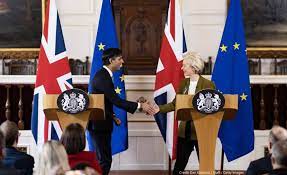
Standing next to the president of the European Commission in London, British Prime Minister Rishi Sunak announced the inauguration of the Windsor Framework on February 27th. The agreement appears to settle the dispute with the European Union over Northern Ireland, which is part of the U.K., while finally giving Brexiteers something to cheer about. When negotiating Brexit’s terms in 2020, London and Brussels disagreed over Northern Ireland’s economic status in relation to its EU neighbor, the Republic of Ireland. As a result, the faulty Northern Ireland Protocol was instituted, meaning that Northern Ireland remains in the EU customs union and avoids a hard border with Dublin. However, the protocol mandated checks on goods flowing to Northern Ireland from the U.K. While other disagreements remain, this provision specifically formed the primary tension hindering London’s reconciliation with Brussels after Brexit. Though Sunak must still convince his colleagues in Belfast (Northern Ireland’s capital), as well as his own party’s Brexit hardliners, the initial reactions are encouraging. If both sides formalize the agreement, the framework opens the door for further cooperation with the EU while giving Sunak the time to focus on the many other pressing issues he faces. However, the Northern Ireland Protocol is a complex issue, and it’s reasonable to wonder what exactly the Windsor Framework changes.
The dispute’s origins date back to The Troubles, a period of prolonged violence in Northern Ireland between the country’s Catholics, who desired unification with Ireland, and the Protestants loyal to London. During The Troubles, the Irish border became a highly militarized zone with security checkpoints and stoppages, embodying the country’s division. By leaving the EU, Belfast leaves the customs union affording the free flow of goods and people among member states. Moreover, the EU and the U.K. agreed during negotiations to avoid a hard Irish border for fears of reigniting the violence ended by the Good Friday Agreement in 1998. The shared sentiment resulted in the protocol stipulating that the north would remain in the EU’s customs union, but with controls on goods flowing between Northern Ireland and the U.K. Effectively creating a hard border between London and Belfast, the Democratic Unionist Party (DUP) of Northern Ireland said the protocol undermined its place in the U.K. and demanded a change to the arrangement.
Under the protocol, all goods entering Northern Ireland from the U.K. had to be checked in port on arrival, stifling trade through added paperwork and bureaucracy. The Windsor Framework establishes so-called green lanes and red lanes, with green lane products intended for sale and consumption within Northern Ireland and thus subject to minimal paperwork. Red lane goods are those expected to flow from Belfast into Ireland and the EU’s customs union and therefore remain subject to the regulatory checks of the protocol. Another serious point of contention regarded the European Court of Justice’s role in unilaterally deciding regulations on certain goods with no mechanism to voice objections. The Windsor Framework introduces an “emergency brake” for new EU rules that, if triggered, leads to a highly complicated institutional process allowing the U.K. to potentially halt the legislation. However, the issue can only be resolved through an avenue jointly agreed upon by the EU and Britain, and the brake cannot be initiated for “trivial reasons.”
The framework works to remedy several other inadequacies of the protocol, such as providing the U.K. greater authority over value-added and excise taxes for certain goods in Northern Ireland. In addition, Medicines no longer need to be approved by the EU regulator, creating a single market for medicines within the entire U.K. Over 60 stringent EU food and drink regulations would be discarded, and English sausages would be available in the supermarkets of Northern Ireland once again. The new framework also modifies restrictions on the movement of pets, “high-risk” seeds and plants, and online shopping.
After weeks of high-level, secretive negotiations with EU officials, the announcement marks a much-needed victory for Sunak and the Conservative Party, which currently trails the opposition Labour Party by more than 20% in the polls. However, the deal needs approval from the DUP in Northern Ireland before Sunak crosses the finish line. The day after the announcement, the prime minister visited Belfast to champion and rally support for the framework. Since last October, governance in Northern Ireland has effectively ground to a halt after the DUP’s members walked out in protest of the protocol. Sunak said the people of Northern Ireland “need and deserve” the return of a functioning government. While the DUP’s leader Jeffrey Donaldson initially reacted positively, nothing is complete until everything is complete.
The progress should be attributed to none other than Sunak’s artful negotiating and more calibrated approach toward Brussels. After becoming prime minister last October, Sunak departed from his predecessor’s brashness and skepticism regarding the EU while demonstrating the will to negotiate in good faith. By removing the most significant obstacle straining their relations, the agreement sets the stage for further cooperation over security, climate change, and other matters of mutual interest. Most importantly for Sunak is claiming his first domestic political victory because every way one looks at it, the U.K. is in crisis. Despite the global economic turmoil, the U.K.’s situation is particularly dire. As the only G7 economy predicted to decline in 2023, the country is experiencing rampant inflation, massive labor strikes, a labor shortage, and a staggering national debt. All this while the state’s welfare services teeter on the brink of collapse.
As a former banker and man of considerable wealth, Rishi Sunak looks like the right man for the job. However, he will need to score several more victories if the Conservative Party hopes to stand a chance in the next elections, which must be held by January 2025. Electing every prime minister since 2010, if the conservatives wish to maintain their parliamentary dominance, they need a Churchillian-like effort and execution from Sunak.
